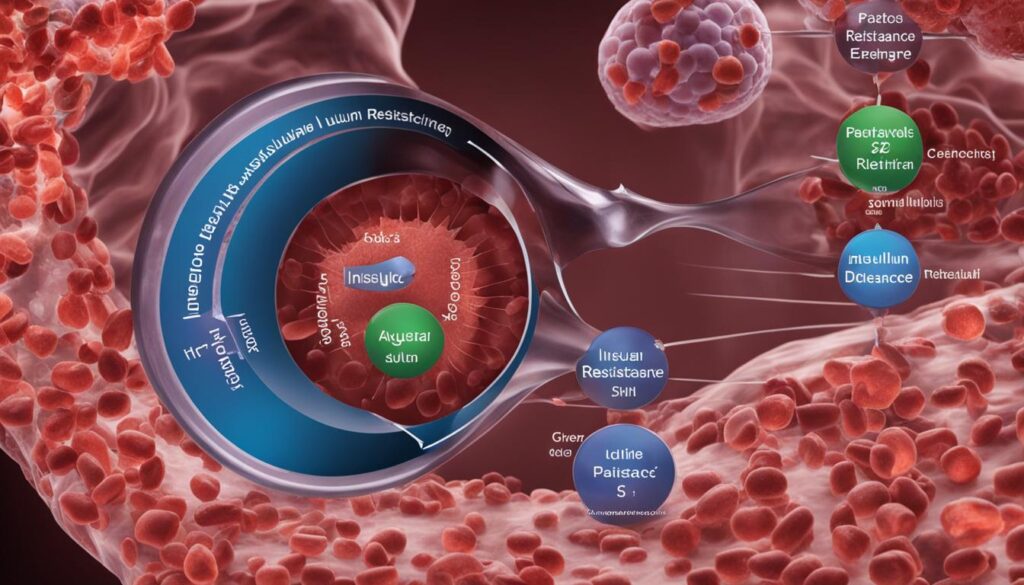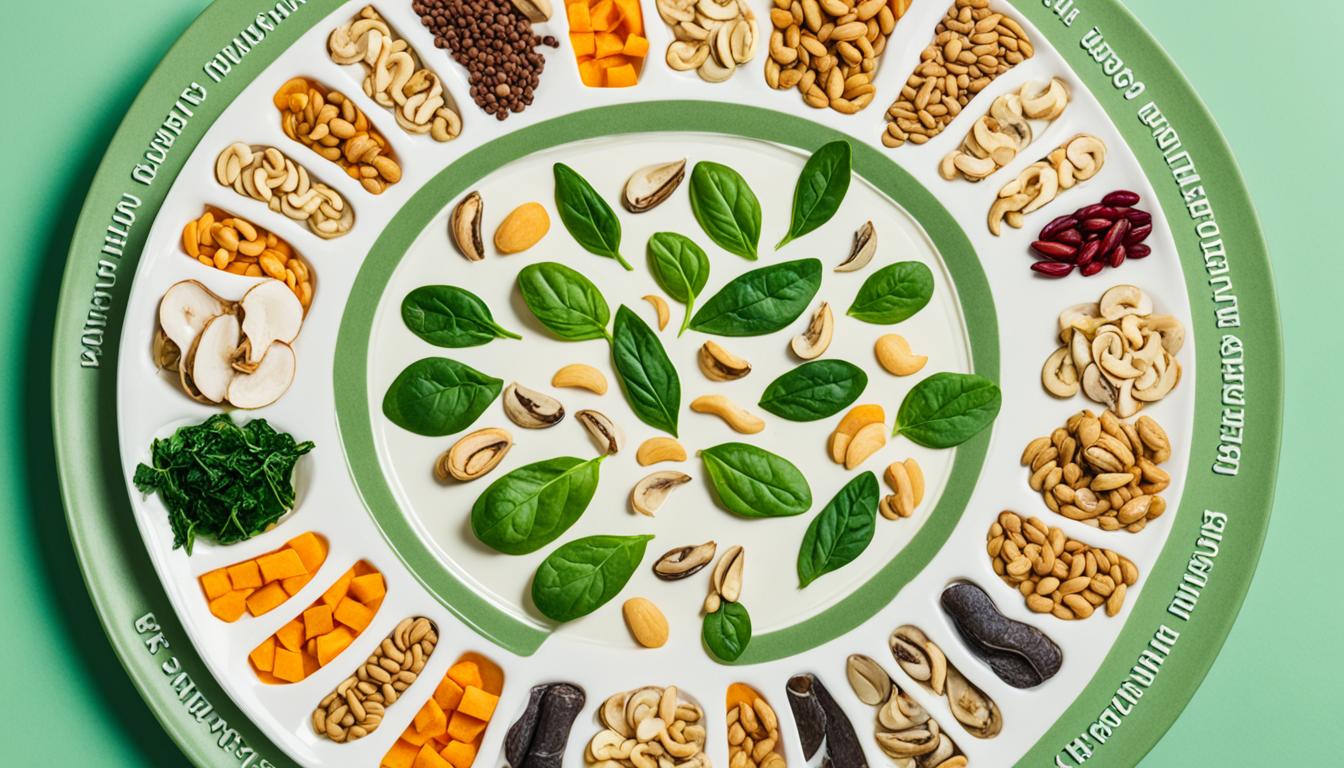Why Insulin Resistance Happens

Have you ever wondered why insulin resistance occurs? What are the causes, risk factors, and complications associated with this condition? Understanding insulin resistance is crucial for preventing and managing related health issues. In this article, we will delve into the inner workings of insulin resistance, exploring its causes, symptoms, diagnosis, and possible treatments. Get ready to unravel the mysteries behind this prevalent condition and discover how you can take control of your health.
Key Takeaways:
- Insulin resistance occurs when cells in the body do not respond effectively to insulin.
- Excess body fat, sedentary lifestyle, genetics, age, and certain medications can contribute to insulin resistance.
- Insulin resistance is closely linked to prediabetes and Type 2 diabetes.
- Early diagnosis and management of insulin resistance are crucial in preventing complications.
- Lifestyle changes, including regular physical activity and a balanced diet, are key to managing insulin resistance.
What is Insulin Resistance?
Insulin resistance is a condition where cells do not respond adequately to insulin, leading to impaired insulin sensitivity. Insulin, a hormone produced by the pancreas, plays a crucial role in regulating blood glucose levels. It facilitates the entry of glucose into cells, where it is either converted into energy or stored for future use.
When cells become resistant to insulin, glucose uptake and storage become inefficient. Consequently, the pancreas compensates by producing more insulin, resulting in a state of hyperinsulinemia. The excess insulin circulating in the bloodstream can lead to elevated blood glucose levels, increasing the risk of developing prediabetes or Type 2 diabetes.
Insulin resistance is not an isolated condition but is closely associated with other health issues, such as metabolic syndrome. Metabolic syndrome encompasses a cluster of conditions, including high blood pressure, abnormal cholesterol levels, and excess abdominal fat. Together, these conditions contribute to an increased risk of cardiovascular disease and Type 2 diabetes.
Understanding insulin resistance and its implications is essential for effective management and prevention. By addressing the underlying causes and making necessary lifestyle changes, individuals can mitigate the risk of developing insulin resistance and related complications.
Insulin Resistance and Diabetes :
Insulin resistance is closely linked to the development of prediabetes and Type 2 diabetes. Prediabetes occurs when blood glucose levels are higher than normal but not yet in the diabetes range. If left untreated, prediabetes can progress to Type 2 diabetes, a chronic condition characterized by insufficient insulin production or decreased insulin utilization by the body.
It’s important to note that while insulin resistance is commonly associated with Type 2 diabetes, it is not the cause of Type 1 diabetes. Type 1 diabetes is an autoimmune condition in which the immune system attacks the insulin-producing cells of the pancreas, resulting in a lack of insulin production.
Gestational diabetes, a temporary form of diabetes that develops during pregnancy, is also linked to insulin resistance. Hormonal changes during pregnancy can make it harder for the body to use insulin effectively, leading to elevated blood glucose levels.
Understanding the relationship between insulin resistance and different types of diabetes is crucial in managing and treating these conditions effectively. By addressing insulin resistance, individuals can take proactive steps towards preventing or managing diabetes and maintaining optimal health.
Risk Factors for Insulin Resistance :
Insulin resistance can be influenced by several risk factors, making it important to understand the various elements that contribute to its development. By being aware of these risk factors, individuals can take proactive steps to reduce their risk and improve their overall health.
Excess Body Fat
Having excess body fat, especially around the waist, is a significant risk factor for insulin resistance. Extra fat in the abdominal area releases hormones and other substances that can interfere with insulin’s ability to regulate blood sugar levels. This makes it harder for cells to respond properly to insulin, resulting in insulin resistance.
Sedentary Lifestyle
A sedentary lifestyle and lack of physical activity can contribute to the development of insulin resistance. Leading a largely inactive lifestyle reduces the body’s ability to effectively use insulin, leading to decreased insulin sensitivity. Engaging in regular physical activity, on the other hand, helps improve insulin sensitivity and lowers the risk of insulin resistance.
Genetics
Genetic factors also play a role in insulin resistance. Individuals with a family history of Type 2 diabetes are more prone to developing insulin resistance. While genetics alone may not determine whether someone develops insulin resistance, having a family history of the condition can increase the likelihood.
Age
Insulin resistance tends to increase with age. As individuals get older, their cells become less receptive to insulin, leading to decreased insulin sensitivity. This age-related decline in insulin sensitivity can increase the risk of developing insulin resistance and subsequent metabolic disorders.
Medications
Some medications can contribute to the development of insulin resistance. Certain drugs, such as steroids, anti-psychotics, and HIV medications, can interfere with insulin’s action in the body, leading to insulin resistance. It is important for individuals taking these medications to be aware of the potential risks and discuss them with their healthcare providers.
By understanding the risk factors associated with insulin resistance, individuals can make informed decisions about their lifestyle and take appropriate actions to mitigate these risks. Adopting a healthier lifestyle, including regular exercise, maintaining a healthy weight, and discussing medication concerns with a healthcare provider, can help reduce the likelihood of developing insulin resistance.
Symptoms and Diagnosis of Insulin Resistance :
Insulin resistance often does not present any noticeable symptoms. It is typically diagnosed during routine health exams or blood tests. Healthcare providers may look for signs such as:
- Increased waist circumference
- Presence of skin tags or dark patches of skin
- High blood pressure
- Abnormal blood glucose levels
These indicators, along with other clinical assessments, aid in the diagnosis of insulin resistance. Medical professionals may perform the following tests:
- Waist circumference measurement: Excess fat around the waist is associated with insulin resistance. A waist circumference greater than 35 inches for women and 40 inches for men is considered a risk factor.
- Blood tests: These tests measure various markers related to insulin resistance. They include:
| Blood Test | Description |
|---|---|
| A1c test | A test that measures the average blood sugar levels over the past three months. A value above a certain threshold indicates prediabetes or Type 2 diabetes. |
| Fasting blood glucose test | A test that measures blood sugar levels after an overnight fast. Elevated levels can indicate insulin resistance. |
| Oral glucose tolerance test | A test that measures blood sugar levels before and after consuming a glucose-rich drink. It helps assess how well the body processes sugar. |
| Insulin level test | A test that measures the amount of insulin in the blood. High insulin levels may indicate insulin resistance. |
These diagnostic methods assist healthcare providers in identifying insulin resistance and determining appropriate treatment plans.
Effects of Insulin Resistance on the Body :
Insulin resistance can have significant effects on the body, contributing to various health complications. One of the notable consequences of insulin resistance is the development of hyperinsulinemia, which refers to the increased production of insulin by the pancreas. This can lead to weight gain, creating a vicious cycle that further worsens insulin resistance.
Insulin resistance is a hallmark feature of metabolic syndrome, a condition characterized by a cluster of health issues. These include excess abdominal fat, high blood pressure, elevated blood glucose levels, abnormal cholesterol levels, and an increased risk of developing cardiovascular disease, stroke, and Type 2 diabetes. The effects of metabolic syndrome can significantly impact an individual’s overall health and quality of life.
Understanding the effects of insulin resistance is crucial in managing and preventing related complications. By addressing insulin resistance and effectively managing blood glucose levels, individuals can reduce their risk of developing metabolic syndrome, cardiovascular disease, and other associated health problems.
| Effects of Insulin Resistance | Description |
|---|---|
| Hyperinsulinemia | The increased production of insulin by the pancreas, leading to weight gain |
| Metabolic Syndrome | A condition characterized by excess abdominal fat, high blood pressure, elevated blood glucose levels, abnormal cholesterol levels, and an increased risk of cardiovascular disease, stroke, and Type 2 diabetes |

Treating Insulin Resistance :
Insulin resistance can be effectively managed and treated through a combination of lifestyle changes and, in certain cases, medication. By making healthy choices and incorporating specific strategies into daily routines, individuals can improve insulin sensitivity and promote overall blood sugar control.
Lifestyle Changes :
Lifestyle changes play a crucial role in treating insulin resistance and improving insulin sensitivity.
- Engage in regular physical activity: Regular exercise, such as brisk walking, cycling, or swimming, can have a significant impact on insulin resistance. Aim for at least 150 minutes of moderate-intensity aerobic activity or 75 minutes of vigorous-intensity aerobic activity each week.
- Focus on weight management: Losing weight, especially excess body fat, can help improve insulin sensitivity. Consult with a healthcare provider or registered dietitian to develop a personalized weight loss plan.
- Adopt a balanced diet: Choose a variety of nutrient-dense foods, including whole grains, lean proteins, fruits, vegetables, and healthy fats. Limit processed foods, sugary beverages, and foods high in saturated and trans fats.
Medication :
In some cases, healthcare providers may prescribe medication to complement lifestyle changes and further improve insulin resistance.
- Insulin-sensitizing drugs: Medications such as metformin or thiazolidinediones (TZDs) can help enhance insulin sensitivity and lower blood sugar levels.
- Antidiabetic medications: Other medications, such as sulfonylureas or dipeptidyl peptidase-4 (DPP-4) inhibitors, can be prescribed to regulate blood sugar levels and improve insulin function.
Treating insulin resistance requires a comprehensive approach that combines lifestyle changes, medication (if necessary), and ongoing monitoring.
By implementing these strategies, individuals can effectively manage insulin resistance, improve insulin sensitivity, and achieve better blood sugar control. Consult with a healthcare provider to develop a personalized treatment plan that addresses specific needs and goals. Empowering yourself with knowledge and taking action can lead to a healthier and more fulfilling life.
Complications of Insulin Resistance :
If left untreated, insulin resistance can lead to several complications, including prediabetes and Type 2 diabetes. These conditions significantly increase the risk of developing cardiovascular disease, such as heart attacks and strokes. Furthermore, insulin resistance can contribute to the development of kidney disease and other metabolic disorders. Proper management and control of insulin resistance are crucial in preventing these complications and maintaining overall health.
Prevention of Insulin Resistance :
Adopting a healthy lifestyle is key in preventing insulin resistance. By implementing the following strategies, individuals can promote insulin sensitivity and reduce the risk of developing insulin resistance:
- Healthy weight management: Maintaining a healthy weight is crucial in preventing insulin resistance. A balanced approach to weight management, including a combination of regular physical activity and a nutritious diet, can help maintain optimal insulin function.
- Regular exercise: Engaging in regular physical activity plays a vital role in preventing insulin resistance. Exercise helps increase insulin sensitivity, allowing the body to efficiently use glucose. Aim for at least 150 minutes of moderate-intensity aerobic activity or 75 minutes of vigorous aerobic activity each week, along with strength training exercises at least twice a week.
- Balanced diet: Following a balanced diet that is rich in fruits, vegetables, whole grains, lean proteins, and healthy fats can support insulin sensitivity. Limiting the consumption of processed foods, sugary beverages, and high-fat foods can help maintain stable blood sugar levels and prevent insulin resistance.
- Avoiding sedentary behavior: Incorporating movement into daily routines is essential in preventing insulin resistance. Avoid prolonged periods of sitting or inactivity. Take breaks frequently, engage in light physical activity, and make an effort to stay active throughout the day.
By prioritizing these preventive measures, individuals can reduce the likelihood of developing complications associated with insulin resistance, such as prediabetes, Type 2 diabetes, and cardiovascular disease.

| Risk Factors for Insulin Resistance | Preventive Measures |
|---|---|
| Excess body fat | Maintain a healthy weight through regular exercise and a balanced diet |
| Sedentary lifestyle | Avoid prolonged sitting and incorporate physical activity throughout the day |
| Genetics | Foster a healthy lifestyle to reduce the impact of genetic predisposition |
| Age | Maintain regular physical activity and a healthy weight to counteract age-related insulin resistance |
| Medications | Discuss the potential impact of medications with a healthcare provider and explore alternative treatment options |
Management and Control of Insulin Resistance :
Effectively managing and controlling insulin resistance requires a combination of lifestyle changes and, in some cases, medication. By implementing the following strategies, individuals can take charge of their insulin sensitivity and regulate blood glucose levels:
Lifestyle Changes
- Increase physical activity: Engaging in regular exercise such as walking, jogging, swimming, or cycling can improve insulin sensitivity and promote overall health.
- Maintain a healthy weight: Losing excess body fat, especially around the waist, can significantly enhance insulin sensitivity and help manage insulin resistance.
- Practice good blood sugar control: Following a well-balanced diet low in processed sugars and carbohydrates can help stabilize blood glucose levels and reduce insulin resistance.
Medication
In certain cases, healthcare providers may prescribe specific medications to support insulin sensitivity and regulate blood sugar levels. These medications may include:
- Insulin-sensitizing drugs: These medications work by enhancing insulin’s effectiveness in the body, improving glucose uptake by cells.
- Antidiabetic medications: These medications help control blood sugar levels and may be prescribed in combination with lifestyle changes to optimize insulin resistance management.
Regular monitoring and follow-up appointments with healthcare professionals are vital to track progress, adjust medication dosage if necessary, and ensure effective management and control of insulin resistance.
Remember, managing insulin resistance is a journey that requires commitment and consistency. By making necessary lifestyle changes and staying proactive in consultation with healthcare providers, individuals can regain control of their health and live a fulfilling life.
| Treatment Methods | Lifestyle Changes | Medication |
|---|---|---|
| Definition | Incorporating physical activity, maintaining a healthy weight, practicing good blood sugar control | Prescribed drugs to improve insulin sensitivity and regulate blood sugar levels |
| Benefits | – Enhances insulin sensitivity – Promotes overall health and well-being – Stabilizes blood glucose levels – Reduces insulin resistance |
– Augments insulin effectiveness – Controls blood sugar levels – Complements lifestyle changes |
| Considerations | – Requires commitment – Regular exercise and healthy eating habits – Consultation with healthcare providers – Monitoring of blood sugar levels |
– Prescription from healthcare providers – Regular follow-up appointments – Dosage adjustments if required |
therefore,
Insulin resistance is a condition where cells do not respond effectively to insulin, resulting in elevated blood glucose levels. This can lead to prediabetes, Type 2 diabetes, and an increased risk of cardiovascular disease and other health complications. To prevent and manage insulin resistance, adopting a healthy lifestyle is crucial.
Regular physical activity, weight management, and a balanced diet play a significant role in improving insulin sensitivity and reducing the risk of developing insulin resistance. By engaging in regular exercise, maintaining a healthy weight, and making nutritious food choices, individuals can lead a healthier life.
Working closely with healthcare providers is essential in developing tailored treatment plans for insulin resistance. They can provide guidance on appropriate lifestyle changes and monitoring blood glucose levels regularly. Taking proactive measures to prevent and manage insulin resistance can have far-reaching implications for overall health and well-being.
FAQ
Why does insulin resistance happen?
What is insulin resistance?
How does insulin resistance relate to diabetes?
What are the risk factors for insulin resistance?
What are the symptoms of insulin resistance?
What are the effects of insulin resistance on the body?
How is insulin resistance treated?
What are the complications of insulin resistance?
How can insulin resistance be prevented?
How is insulin resistance managed and controlled?
What is the summary of insulin resistance?









